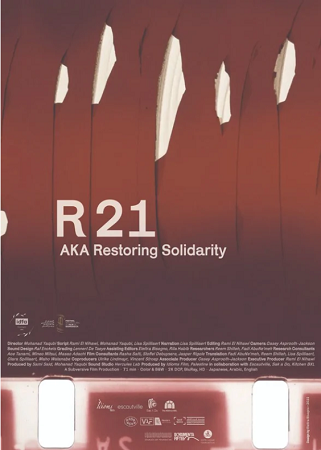
R 21 aka Restoring Solidarity 2022
Distributed by Collective Eye Films, 1315 SE 20th Ave. #3, Portland OR 97214; 971-236-2056
Produced by Sami Said
Directed by Mohanad Yaqui
Streaming, 71 mins
College
Arab-Israeli Conflict; International Relations; Propaganda
Date Entered: 12/15/2023
Reviewed by Joseph Baumstarck, Jr., Adjunct Professor - Ivy Tech Community College and Independent ScholarR 21 aka Restoring Solidarity is a spliced collection of twenty black and white films discovered in a Japanese archive. The films are snapshots of the Arab-Israeli Conflict from the late 1960s through the 1980s. It appears that their original purpose was to promote a Japanese Arab unity about the treatment of Arabs in Palestine by Israel and the Japanese during the American occupation following World War II. Unfortunately, the vignettes selected from each film to make R 21 do not tell a coherent story or educate anyone on the situation in the Middle East.
The films are all in black and white, and the quality varies, as would be expected from archived reel-to-reel films from the era represented. Most of the sound is in Japanese or Arabic, with English subtitles. The translation to English in the subtitles is marginal and captures the speech's essence on screen but lacks much of the nuance. The twenty films combined to create this film are from widely divergent areas in the Middle East over an almost twenty-year period and represent significantly different portions of the greater conflict. The nuance of these differences is glossed over by this film and never explained, discussed, or identified.
The result is a film that appears to be little more than a propaganda piece for the Arab position. It suffers from most of the deficiencies of propaganda. It is shallow, gives little to no background, contains film footage that appeals to the emotional level without any intellectual explanation for the images, represents an obviously slanted view of the events that are depicted, and provides no input from the Israeli side. In the film, the Arabs appear to be totally innocent and the victims of random acts of terror and oppression by the Israelis. There is no acknowledgment of the obvious Arab failures, which contributed in no small part to many of these Israeli failures.
Overall, this is a poorly done film that does not accomplish the apparent objective of the original twenty films. This film does not appear to have much appeal for a modern audience at any level. R 21's main contribution is identifying that these twenty films exist in a Japanese archive, and hopefully, researchers will be interested in pursuing the original films. The film is rated not recommended because of the above failings and the perceived lack of audience for it. Its most valuable use might be in college courses discussing propaganda.
Published and licensed under the Creative Commons Attribution 4.0 license. Anyone can use these reviews, so long as they comply with the terms of the license.